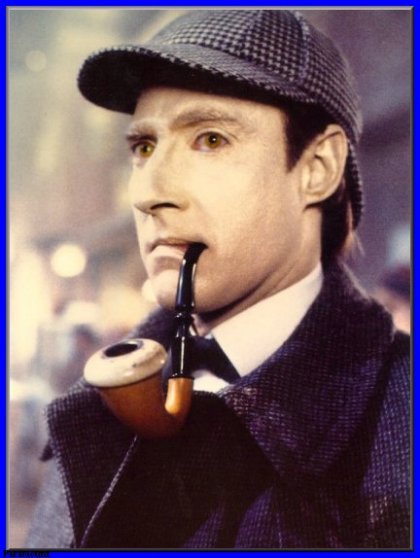The Comics Market
Public Perception
Practitioner Diversity
Genre Diversity
Escapism
The Computer-assisted Artist
Stylistic Considerations of Computer Art
The Computer As Artist
The End of Print?
Infinite Canvases
Becoming Like Film
Sound and Animation
Multimedia Comics
Interactivity and Alternate Pathways
 McCloud introduces the topic of virtual reality in an unsettling manner on p. 211, showing a sad, glabrous character handling a ball in the darkness. The tiny ball begins to grow until it's larger than the character's head. Then the character closes his/her eyes as his/her face intersects with the ball.
McCloud introduces the topic of virtual reality in an unsettling manner on p. 211, showing a sad, glabrous character handling a ball in the darkness. The tiny ball begins to grow until it's larger than the character's head. Then the character closes his/her eyes as his/her face intersects with the ball.
The text for the sequence is equally disquieting. Beginning just before it, McCloud writes, 'The desire to make art come alive brings us back to the escapist impulse I mentioned at the end of Section One. Storytellers in all media and all cultures are, at least partially, in the business of creating worlds.
'It's a mark of their success when those worlds are so vivid that we forget they aren't real. This can be done through a medium as simple as text or speech-- but the reproduction of sight and sound in the minds of the audience will often be outbid by new technologies that reproduce them in full.
'And at the first sign of a technology that can deliver vivid, uncompromising immersion, few will be able to resist its spell-- and many may even trade in the world they're given at birth for the new worlds that technology and imagination will combine to create.'
Notice how this passage subtly implies that virtual reality is evil. While on p. 177 McCloud tried to reassure us that digital technology replacing books was 'merely about one technology overcoming another,' in this passage technology is an active force, outbidding and delivering; no direct mention is made of any artists being involved (they are indirectly referred to by the word 'imagination.')
Technology is casting a 'spell' the audience is helpless to resist. And the reference to people forsaking 'the world they're given at birth' is frightening and distopian, and even seems to suggests that virtual reality is sacriligeous!
Note the implication that this hellish nightmare of dehumanization is the logical extension of 'escapist impulses.' Also note that film, which can reproduce sight and sound 'in full,' is implicated in this terrible end game of human subjugation.
But rather than harboring a deep distrust of vivid, seductive media, wouldn't it be be more constructive to assess the prospects of virtual reality in a dispassionate and realistic manner?
First of all, a total virtual reality device is not likely to exist in our lifetime. Sight and sound may be controlled in the near future to 'fool' the mind into thinking they're real. But the sense of touch is more difficult, inertial awareness quite difficult , and the sense of taste practically impossible.
Furthermore, the cost of creating this system and maintaining it will be considerable. The person experiencing the virtual reality will have to be in a chamber that combines sensory deprivation (to block out the actual world) with the ability to produce all the virtual effects. If it simulates inertial awareness the way the Universal Studios BACK TO THE FUTURE ride does, it will have to be able to lift, rotate, and shake the subject in precise increments!
The computing power needed to coordinate the various devices will be enormous. Since the program will not be able to anticipate in advance what the character is going to see, it must be able to synthesize perfect 3-D CGI instantaneously! Furthermore, the program must be capable of responding to the subject's decisions in a realistic, unstereotyped way. Assuming the virtual world has virtual characters in it, the program must be able to portray them as responsive individuals who learn from experience.
The most complex artificial intelligence programs in the world can't do even a fraction of what a VR program must do.
But setting those objections aside, does virtual reality have the seductive potential McCloud fears? The popularity of 'virtualized' video games would suggest so, but I think these games are appealing because they're fast moving, colorful, funny, give free reign to the player's destructive impulses, and can be operated in a congenial multi-player setting.
There's a key disadvantage to virtual reality as a means of escapism. As I said earlier, readers want to escape from themselves as much as from their world. Genre fiction allows them to identify with someone who is smarter, braver, stronger, or more attractive than themselves.
But the whole point of virtual reality is to create an environment for readers to exist in, not a character for them to follow around. You don't become Spiderman, as McCloud suggests. Spiderman becomes you. Virtual reality provides little or no escape from the self.
In any case, we certainly don't face the prospect of total immersion VR in the near future. Instead, we have a number of systems for creating partial VR; and digital technology provides many new methods of creating partial VR. None of these systems are replacements for reality, or would ever be thought so by normal users.
Rather, VR as it now exists is a legitimate mode of artistic expression. The act of role-playing has many potential benefits for the reader, and the creation of whole worlds offer many opportunities for satire, social commentary, and the exercise of pure imagination.
Frankly, I don't expect that any VR creation will ever be as seductive as a good character-driven story. But lets lighten up and give them a chance!